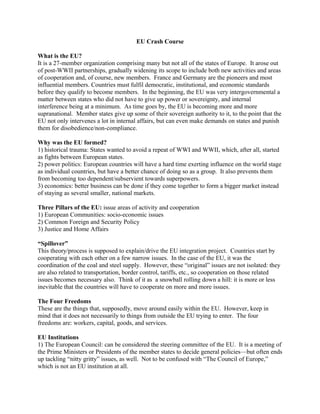The EU is a 27-member political and economic organization that arose from post-WWII partnerships and has gradually expanded its scope and membership. It began as an intergovernmental cooperation between states but has become more supranational over time, with member states giving up some sovereignty. The EU was formed to promote economic cooperation, prevent future conflicts, and increase members' influence on the world stage. It is comprised of the European Communities, Common Foreign and Security Policy, and Justice and Home Affairs pillars.

